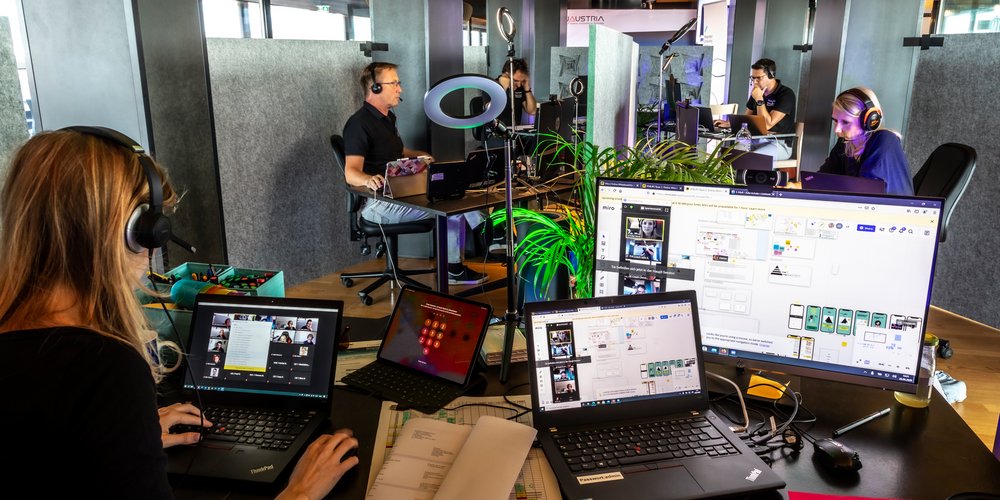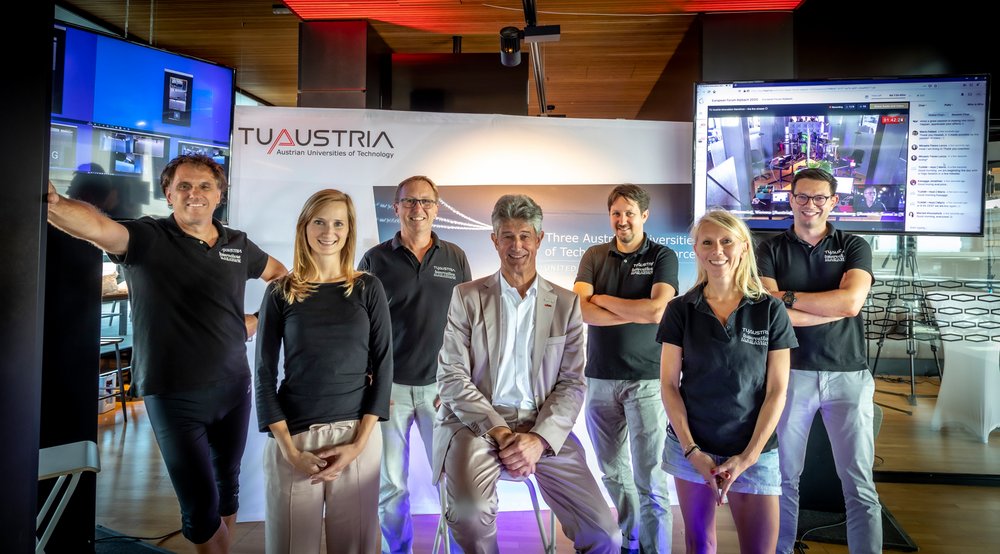Since 2016, TU Austria – the association of the three Austrian universities TU Wien, TU Graz and the Montanuniversitaet Leoben – have been organising the Innovation Marathon: a 24-hour event in which international students work together to solve challenging tasks from companies.
While in past years the students met for several days at the European Forum Alpbach, in whose programme the Innovation Marathon is integrated, this year the event took place digitally due to corona. “Cooperation took place exclusively online, and all students were in their home or study location," says Innovation Marathon project manager Mario Fallast. The TU Austria organization team and the innovation coaches of the Integrated Consulting Group, who moved their workplace to Graz University of Technology during the 24 hours of the event, digitally networked the students via Zoom and formed virtual teams around the world according to their education and interests. From Cairo to Graz, from La Paz to Cape Town, from Munich to Nairobi.
Multidisciplinary teams
This year, 50 students were selected from almost 100 applications. The fields of study were varied and ranged from natural science subjects such as polymer chemistry or biomedicine to technological studies such as mechatronics and computer sciences, and humanities subjects such as theatre or communication sciences. The students were divided into ten teams of five; this time the challenges came from the Austrian companies Liebherr,ams, AVL, Philips und voestalpine Wire Technology.
Wide range of topics
Answers had to be found to questions such as how cars, when used as measuring devices, can help people to stay healthy (AVL's task) or what requirements health sensors of the future will have to meet (ams). In addition, the students had to explore possibilities for adaptive cooling, which refrigerators use to adapt their functionality to individual behaviour in the household (Liebherr). Also on the agenda were ideas for a mobile app that changes people's eating habits with the help of playful elements (Philips) and the development of a new process for supply chain management to ensure that products only reach customers in perfect condition (voestalpine Wire Technology).
Familiar digital terrain
The new setting did not harm the innovative results. This year’s TU Austria Innovation Marathon was characterized by extremely concentrated work. "Apparently, the students – all of them millennials and younger – felt completely at home in the virtual world. Even the concentrated work with the digital tools was easier for them than we were used to seeing in past years,” said ICG coach Julia Achatz at the end of the Innovation Marathon. In addition to communication via zoom, the teams organized themselves independently via WhatsApp, and voting processes were handled with survey software.
Many raw ideas, helpful interim results and new approaches have emerged, which will provide companies with impulses and food for thought for innovative applications. Harald Kainz, Rector of TU Graz and acting President of TU Austria, is enthusiastic about the event: "This year's situation was special for everyone involved. To handle an event of this size and under these conditions requires not only technical and digital skills, but above all persistence, emotional intelligence and team spirit. The students have impressively demonstrated that they all possess these fundamental qualities. Qualities that will help us move forward as a society."
RTI is the blood in the veins of successful companies
"Research, technology and innovation – RTI for short – are of inestimable importance for industry and indispensable when it comes to new products, services and business models," says Georg Knill, president of the Federation of Austrian Industries. In particular a small, export-oriented economy like Austria can only score points through quality and innovation. “RTI is our unique selling point on international markets that brings us more export success, investments and thus more jobs," says Knill. But the corona crisis has also demonstrated the clear benefits of technology, keyword digitalization – "just as internationally coordinated research efforts will ultimately open up the way out of the pandemic". For this reason, Austria and Europe should focus even more strongly on RTI and significantly intensify their commitment in this area. Events such as the Innovation Marathon are therefore important steps and in a way a "model for the future".
The President of the Austrian Patent Office, Mariana Karepova, was impressed by the concept of the Innovation Marathon, and her team once again provided the students with advice and support as usual: "Top companies with hundreds of patents and young researchers with little experience in IP (intellectual property) – nowhere do the two worlds meet as perfectly as at the Innovation Marathon. The event helps us to show students that they create intellectual property at so many points in their university life and that it always makes sense to have it protected. Applause for the innovation marathon – keep it up, every year!"
The Alpbach Technology Talks are organized by AIT Austrian Institute of Technology and ORF Radio Österreich 1 in cooperation with the European Forum Alpbach.
Further information about the TU Austria Innovation Marathon can be found online at www.innovations-marathon.org. Many insights and glimpses behind the scenes of the event itself can be found at facebook.com/innovations.marathon.
Contact:
DI Mario Fallast
Project Manager TU Austria Innovation Marathon
TU Graz | Research & Technology House
M +43-664-3332355
mario.fallast@tugraz.at

